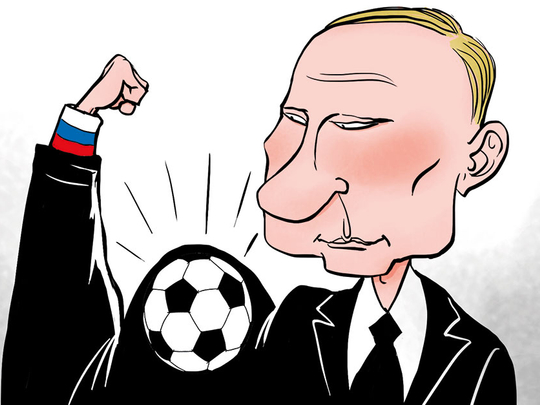
The Fifa World Cup, the globe’s biggest sporting event alongside the Olympics, enters its first full week today after a successful start. With Russia’s reputation reeling in much of the West, recently re-elected President Vladimir Putin is pinning his hopes to the prospect that the tournament will provide a big boost to the nation’s international image and be part of his eventual political legacy.
A key goal of the organisers is therefore to present a vision to international publics of a stable, modern, vibrant country. And with a multibillion audience watching, the nation has sought to capitalise on a first class opportunity to showcase its credentials as a destination for future investment and tourism. Yet, while hosting such major contests commands national prestige, as Putin is well aware, they carry huge operating costs to run them and maintaining security, plus wider political risks and controversies too. For instance, when Russia was awarded in 2010 the hosting of the World Cup, it was not as politically and economically isolated as it is today from the West, despite gambits such as its 2008 invasion of Georgia.
In 2010, then-prime minister Putin said that he wanted the World Cup to showcase his country at its best. However, fast forward to 2018 and Russia, post the 2014 annexation of Crimea (which happened soon after the Sochi Winter Olympics) and subsequent tensions in Ukraine, is excluded from the G8, with a string of more recent controversies including its backing for the regime of Bashar Al Assad in Syria; its alleged involvement in the poisoning of ex-spy Sergei Skripal and his daughter in England; and its presumed meddling in a series of western elections, including the 2016 US presidential ballot.
Post-Crimea’s annexation, numerous senior western politicians called for Fifa to review its awarding to Russia of the hosting of the World Cup, a 2010 decision that was subsequently investigated by the FBI after allegations in media of irregularities and corruption in the process. Separately, in the wake of the recent chemical weapon attacks in England, Russia has been subject to a series of new western sanctions and diplomatic expulsions.
Moreover, more than 60 members of the European Parliament have signed a letter calling on EU leaders to back a UK boycott of the tournament. The latter will mean no British ministers or diplomats attending to try to avoid Putin basking in what UK’s Foreign Secretary Boris Johnson said could be the glory of the World Cup in the same way as Adolf Hitler at the 1936 Olympics in Berlin.
This UK stance mirrors the decision of numerous world leaders in 2014, including then US president Barack Obama to decline to attend Sochi, partly for human rights reasons, including Russia’s then new homosexuality law. This anti-gay stance, part of Putin’s populist political agenda in Russia of defending what he views as traditional family values, remains contentious with many internationally.
In this tricky diplomatic context, Putin wishes to convey to a big global audience that Russia remains a major power, and that Western attempts to side line and isolate it are failing. This core theme of seeking global prestige and respect was central to his re-election campaign, tapping into the 75th anniversary of the Soviet Union’s victory over Nazi Germany, and building upon his mission since assuming power from Boris Yeltsin of trying to restore Russia’s geopolitical prominence.
Moreover, with Putin now at the start of what he has said will be his final six-year presidential term, he is thinking much more about his legacy accomplishments as prime minister and president from 1999 to 2024. Extraordinarily, this is a longer period at the top than all the Soviet Union’s supreme leaders, except Joseph Stalin.
As with Sochi in 2014, Putin has overseen massive investment in World Cup-related infrastructure by spending a forecast $11 billion on stadiums, and upgrades to airports and transit in 11 Russian cities, from the Baltic Sea port of Kaliningrad to Yekaterinburg, east of the Ural Mountains. This sum adds to the estimated $51 billion spent in Sochi that made it easily the most expensive winter games in history, and more than three times as costly as the London 2012 summer Olympics.
Unquestionably, Putin sees the hosting of the World Cup as a key part of his accomplishments. He perceives this as sitting alongside not just Sochi, and big infrastructure projects such as the construction of a bridge to the Black Sea peninsula, but also wider geopolitical plays like Crimea’s annexation, and Russia’s increased significance internationally, including in the Middle East through his strong support for Al Assad’s regime.
Taken overall, significant risks and controversies remain for Russia in hosting the World Cup, but Putin will to try to ride these out in a bid to see his international standing and reputation enhanced by a successful tournament. If this happens, the tournament could prove a key moment in his attempts to build his political legacy while also consolidating domestic support for the remainder of his presidency.
Andrew Hammond is an Associate at LSE IDEAS at the London School of Economics.










